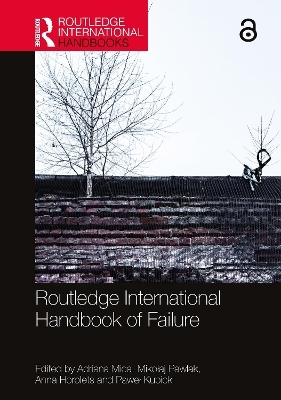
Routledge International Handbook of Failure
Routledge (Verlag)
978-1-032-37104-7 (ISBN)
Underlining critical mechanisms for challenging and reimagining norms of success in contemporary society, it allows readers to understand how contemporary regimes of failure are being formed and institutionalized in relation to policy and economic models, such as neo-liberalism. While capturing the diversity of approaches in framing failure, it assesses the conflations and shifts which have occurred in the study of failure over time.
Intended for scholars who research processes of inequality and invisibility, this Handbook aims to formulate a critical manifesto and activism agenda for contemporary society. Presenting an integrated view about failure, the Handbook will be an essential reading for students in sociology, social theory, anthropology, international relations and development research, organization theory, public policy, management studies, queer theory, disability studies, sports, and performance research.
Adriana Mica is an assistant professor at the University of Warsaw where she leads the Failure Lab. Her research interests include failure, possibility, ignorance, projectivity, and contingency in policymaking Mikołaj Pawlak is an associate professor at the Institute of Social Prevention and Resocialisation, University of Warsaw, where he leads the Chair of Sociology of Norms, Deviance and Social Control. His research interests cover new institutional theory, migration studies, and sociology of knowledge/ignorance. Anna Horolets is an associate professor at the Institute of Ethnology and Cultural Anthropology, University of Warsaw. Her research interests include critical discourse analysis, anthropology of tourism and migration, and leisure studies. She currently studies migrants’ imaginaries of the good life. Paweł Kubicki is an associate professor at the Warsaw School of Economics where he leads the Department of Social Policy. He specializes in public policy analysis, particularly in disability studies, migration studies, and social exclusion, being involved in projects aimed at developing equalizing opportunities for persons with disabilities.
Introduction
1. FAIL! Are We Headed Towards Critical Failure Studies?
PART 1: Critical Failure Studies in the Making
2. Failure in Intercultural Communication
3. Entrepreneurial Failure Contextualized: Sociocultural Approaches
4. Fear of Failure in Athletes: Fanning the Fire of Sport Desire or Burning Out?
5. Career Failure: Forms and Levels of Analysis from a Sociological Perspective
6. Sociology of Failures in Clinical Trials
7. From Varieties of Failure to Failure Judgments: The Sociology of Valuation and Failure Studies
PART 2: Failure Regimes and Power
8. Failed Identities: On the Processes and Meanings of Unformed Alternate Selves
9. The Study of Failures and the Problem of Contingency
10. Successful Failure
11. The Theatre of Failure: Social Media’s Role in Demonstrating Mundane Disruption
12. Economising Failure and Assembling a Failure Regime
13. Foreign Policy Failure: A Narrative Analysis
14. Valuing Plurality: Objectivist and Interpretivist Approaches to the Study of Mistakes and Failures in International Relations
PART 3: Restoring, Learning and Attributing Blame for Failure
15. Before Breakdown, After Repair: The Art of Maintenance
16. Cloud Backup and Restore: The Infrastructure of Digital Failure
17. Governance Failure, Metagovernance Failure, and the Pedagogy of Failure
18. Beyond Policy Accidents: Learning the Lessons of Policy Failures
19. Market Failures
20. Preventing Major Disasters: Success and Failure as Two Sides of the Same Coin
21. Blame Games: Stories of Crises, Causes, and Culprits
PART 4: Failure Trouble and Resistance in Neoliberalism
22. Counter-interpretations of Failure from Literature, Sociology and Social Philosophy
23. The Material Ecologies of Policy Failure: Ruptures of Bodies and of State
24. Financialization and Failure: Lessons from the Anxious University
25. Market Failures and Failed Marketization: Neoliberalism, Development and Poverty
26. Failing the States: The Fragility of the State-Failure Paradigm
27. Neoliberalism, Policy Failures, and the COVID-19 Crisis: Going Beyond Hirschman’s Fracasomanía
PART 5: Post-Failure or Reimagined Failure?
28. Experiments as Successful Failures
29. How Science Fails Successfully
30. Politics, Sociology, and the "Inevitability" of Failure
31. Cripistemologies of the Body: Knowing through Disability
32. Beyond Failure: Queer Theory’s Fallibilities
33. Gravity Matters: A Meditation on Falling and Failing
34. Crashing to Earth: Redefining Failure in a Time of Precarity
Afterword
35. Discovery and Inquiry Pathways to Navigating the Routledge International Handbook of Failure
| Erscheinungsdatum | 05.10.2022 |
|---|---|
| Reihe/Serie | Routledge International Handbooks |
| Zusatzinfo | 16 Tables, black and white; 2 Line drawings, black and white; 6 Halftones, black and white; 8 Illustrations, black and white |
| Verlagsort | London |
| Sprache | englisch |
| Maße | 174 x 246 mm |
| Gewicht | 984 g |
| Themenwelt | Sachbuch/Ratgeber ► Gesundheit / Leben / Psychologie ► Psychologie |
| Sozialwissenschaften ► Soziologie | |
| ISBN-10 | 1-032-37104-8 / 1032371048 |
| ISBN-13 | 978-1-032-37104-7 / 9781032371047 |
| Zustand | Neuware |
| Haben Sie eine Frage zum Produkt? |
aus dem Bereich


